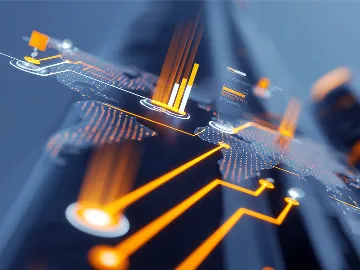The Internet of Things (IoT) is among the most widely used technologies in manufacturing, healthcare, transportation, utilities, and other spheres. Industry leaders such as Weinman, Cardo Systems, Anoto, Locinox, and others have chosen to enhance the connected devices' performance and data collection and analytics.
While the technology's advantages made it even more popular among various-sized companies, it has also increased the competition for IoT tech talent. Below, we'll review the tasks IoT experts cover, where to find a reliable IoT development team for your project, and what to look for in candidates for IoT development positions. And as the following IoT market trends suggest, the time to build or augment your tech team with IoT experts is now.
IoT market trends and stats
With the decreasing costs of sensors and hardware, more companies are revisiting their IoT strategies and considering the options for investing in IoT to receive the best ROI. Here are a few stats from recent reports indicating further positive adoption dynamics.
- According to IoT Analytics' research, the top five IoT use cases are process automation, quality control and management, energy monitoring, real-time inventory management, and supply chain track and trace. The global adoption rate and investment amount are increasing for these IoT use cases, with real-time inventory management topping the list.
- The enterprise spending on IoT worldwide is expected to increase from $301B in 2024 to $690B in 2030, as Statista report suggests.
- According to an IoT Market Size report, the largest share of global spending on enterprise IoT technologies in 2023 was dedicated to IoT hardware (49%). The list is followed by IoT services (24%), IoT software (24%), and IoT security (2%).

While the market predictions and trends look promising, it's also worth noting that adopting IoT solutions makes a tangible impact for businesses. As Eseye's 2024 State of IoT Adoption Report mentions, 63% of respondents agreed that adopting IoT products and solutions increased their revenue, 57% said it delivered a competitive advantage, and 57% said it contributed to sustainability goals. Since revenue, competitive edge, and sustainability are among the all-time top focus areas for companies across all industries, businesses will be seeking IoT development teams or a few IoT engineers to adopt these technologies in their processes. Here's a short overview of the common tasks a typical IoT developer may do.
What tasks do IoT developers cover?
In general, the core tasks of the Internet of Things developers boil down to working with hardware devices, software, sensors, AI, and ML algorithms. However, the duties of an IoT team vary depending on the industry, the project's specifics, and the experts' skills. For example, the IoT development team at N-iX can help you with the following tasks:
- Hardware integration: configuring and connecting IoT devices and sensors; integrating microcontrollers, processors, and communication modules.
- Firmware development: developing and optimizing embedded software for IoT devices; implementing low-level programming for device control and data collection.
- Network connectivity: setting up and configuring IoT networks between various IoT layers (Zigbee, Bluetooth, Wirepas, etc. for device-to-gateway level, and MQTT, CoAP, HTTP, LTE, and others for device-to-cloud); ensuring stable and secure communication between devices and the cloud;
- Cloud integration: connecting IoT devices to cloud platforms (AWS, Azure, or Google Cloud); implementing scalable and secure cloud architectures for data storage and processing.
- Data management and analytics: collecting, processing, and analyzing data generated by IoT devices; creating AI/ML algorithms for predictive analytics and real-time insights.
- Application development: building IoT applications (including mobile) for device management, monitoring, and control; developing user interfaces and dashboards for data visualization.
- Security insurance: ensuring data encryption, authentication, and secure communication; performing vulnerability assessments; implementing security protocols.
- Testing and maintenance: testing for IoT systems for performance and scalability; maintaining and updating firmware, software, and hardware.
- Interoperability assessment: ensuring compatibility among devices, systems, and protocols for seamless integration; implementing APIs and middleware to connect diverse components.
- Energy optimization: enhancing battery life and power management for IoT devices; assessing device/battery energy consumption; optimizing hardware/software performance.
Experienced IoT specialists may have skills to cover several tasks, so you should be very specific about the project requirements and the developer's expertise during hiring. If you need a whole IoT development team, here are a few things to consider.
Building a development team for IoT projects
The composition of your dedicated IoT software development team depends on your business needs. However, your IoT engineers should be able to guide you through every delivery stage, from prototyping to development to post-delivery support. Moreover, the experts of the team should have the needed skills to complete tasks within the project's architecture layer (device, gateway, cloud, data, UI/UX).
A core team usually includes at least one specialist per layer but it depends on the project complexity and scope. For example, an IoT team may have firmware, back-end, and front-end engineers, DevOps and AQA specialists, data analytics, and UI/UX designers. Your project may also need expertise in mobile app development, cloud, Big Data, business intelligence, business analytics, and cybersecurity.
The team size should correspond to the project scale, resources, and tasks. The list of typical IoT roles in a team usually features:
- Business analysts;
- Hardware designers;
- Embedded firmware developers;
- Wireless communications experts;
- Back-end developers;
- Front-end developers;
- Mobile developers;
- Cloud computing engineers;
- Edge software engineers;
- Automation and systems integration engineers;
- DevOps and DevSecOps engineers;
- Data scientists;
- AI/ML developers;
- AQA specialists, and others.
If you're building a team for a custom end-to-end IoT solution, it should have an IoT architect to design high-level architecture and ensure smooth solution integration with your systems. In addition, the complex projects require a skilled project manager (PM) to help set up the processes and communication.
IoT projects should involve developers with experience in developing IoT solutions for similar companies to ensure you'll finish it within a set time. Here's where you may find the best experts.
Where to look for the best IoT engineers?
IoT outsourcing is no different from outsourcing other IT services. This means that there are three most common outsourcing destinations: Europe, Latin America, and Asia. These markets offer a wide range of benefits, including a vast talent pool, high price-quality ratio, locations convenient for development offshoring and nearshoring, and more.
N-iX, for example, has over 2,400 software engineers on board across Poland, Bulgaria, Colombia, Romania, Ukraine, and other countries. We hire our tech experts from 25 countries where we've established a strong employer brand. Our delivery centers are located worldwide, so you can choose the most convenient location to hire an IoT development team. Moreover, with representative offices in the USA, Malta, the UK, and Sweden, we help you navigate the hiring and onboarding process effectively in accordance with the local requirements.

Once you have a project idea and a preferred location to hire the best IoT engineering team, here are the skills and competencies you should prioritize.
Top tech skills for an IoT team
The skillset you're looking for in IoT experts should reflect short- and long-term project requirements. For example, if your project includes cloud integration, it would be better to hire an IoT developer with cloud expertise so they can continue working on the project without you having to hire another tech expert.
In addition, having an approximate timeline allows you to plan the onboarding and engagement of IoT engineers with specific tech expertise, which can help you optimize the resources and avoid project stagnation.
While the project requirements will vary, here's a list of skills you should seek in candidates.

Proficiency in required programming languages
IoT specialists must master key programming languages to build efficient, scalable, and versatile solutions. IoT team members must be proficient in programming languages like Python, C++, JavaScript, and Node.js to address the diverse needs of IoT applications:
- C and C++ are critical for hardware interaction and embedded systems;
- Java enables platform-independent applications;
- Python supports rapid prototyping and data analysis;
- JavaScript with Node.js powers real-time, web-based IoT applications, ensuring seamless device communication and control.
Developers skilled in these languages can create reliable, scalable IoT systems capable of handling complex tasks.
Knowledge of networking protocols
Efficient data transmission is the backbone of IoT systems, making expertise in networking protocols essential. The IoT engineering team should have experience working with the networking protocols on the levels the project requires to ensure reliable data flow within IoT ecosystems. For example, on the device-to-gateway level, it can be Zigbee, Bluetooth, etc., while on the device-to-cloud it may be MQTT, CoAP, HTTP, and others. Developers well-versed in these and other protocols can design interconnected systems that maintain optimal performance even under demanding conditions.
Cybersecurity expertise
IoT solutions must be resilient against cyber threats, making developers with a strong grasp of encryption, secure boot processes, and authentication mechanisms invaluable. Addressing vulnerabilities with the best security practices ensures the safety of sensitive data and the integrity of IoT networks. This expertise is critical in highly regulated sectors like healthcare, manufacturing, and automotive, where security breaches can have serious consequences.
Cloud computing skills
Depending on the project requirements, your IoT team may need an expert in cloud engineering. This skill is essential for IoT projects involving real-time analytics, management of large-scale IoT systems, AR, VR, CV, and ML integration. However, not all of the tasks require the same level of cloud computing proficiency, as it all depends on what IoT architecture level (device, gateway, cloud, data, UI) the IoT engineering team works.
For example, if the engineers deal with hardware design and firmware development, they would need to understand how the solution will connect to the cloud. In case they work on IoT data analytics, they would require both data analytics and cloud computing skills to ensure smooth data flow and processing.

In addition, IoT projects often have challenges in connectivity, interoperability, and scalability. Developers with strong experience with cloud platforms like AWS, Azure, or Google Cloud can tackle these issues effectively. Cloud expertise allows seamless deployment, real-time data processing and analytics, and complex data manipulations.
Explore the topic: IoT cloud: Case studies and best practices
Data analytics and visualization proficiency
Since IoT devices generate vast volumes of data, a team should have an Internet of Things developer with frontend experience in IoT data visualization. Moreover, reliable data enables predictive maintenance and helps companies improve operational efficiency and make better decisions. Combining data expertise with Machine Learning capabilities further amplifies the value of IoT solutions, driving innovation across industries.
Integrating AI with IoT is a hot trend for 2025. Learn how AIoT can help you transform your business.
Experience in embedded software programming
Embedded software programming skills are critical for IoT developers to create efficient, reliable, and resource-optimized firmware essential for IoT systems. In addition, they're a backbone of seamless integration of hardware and software components in IoT devices.
These skills include proficiency in low-level programming languages like C and C++, real-time operating systems (RTOS), and knowledge of hardware interfaces such as GPIO, SPI, and I2C. Finding IoT experts with these skills is only a part of the job to ensure IoT project success. Here's what you should do to build a highly efficient IoT developers team.
Tips on how to build an IoT development team effectively
1. Define your IoT project goals
Identifying the project goals, scope, and tasks will help you plan IoT development and guide you in assembling the team that could deliver the results within the desired timeframe. If you're working on IoT solutions, you can consult with an IoT architect who can help you plan the project and the resources necessary to complete the project successfully.
2. Detect IoT skill gap
IoT projects have different dimensions to them. You may need experts with skills in IoT hardware, firmware, cloud computing, AI, data analytics, or other domains to receive the expected results. Identifying the skill gap from the onset will allow you to optimize your resources and plan the project execution. Moreover, it will help you choose the most optimal engagement model for your scope and budget.
3. Choose the most appropriate IoT team staffing approach
If you decide to outsource, make sure you opt for the most suitable team extension approach. Many software development companies with IoT expertise offer different engagement models for your staffing strategy. With N-iX, for example, you can choose among Extended Team, Managed Team, and Custom Solution Development options. We also offer IoT consulting services to help clients build the best execution strategy for their IoT projects.
4. Prioritize security and compliance
Since IoT security remains a core focus among IoT adopters, ensure your team includes cybersecurity and QA experts. It will help you build secure, standards-compliant solutions and avoid practices that can entail security risks.
N-iX software engineers hold various industry-specific and cross-industry certifications. As a company, we comply with international standards like PCI DSS, SOC 2, FSQS, CyberGRX, ISO 9001:2008, ISO 27001, ISO/IEC 27701:2019, and GDPR. Moreover, we can develop HIPAA-compliant IoT solutions for the clients in the healthcare industry.
5. Compare in-house and outsourcing options
There are three options for building a strong IoT software development team:
- Hiring IoT engineers in-house;
- Outsourcing IoT development to another country;
- Combining these two options.
The choice will depend on the project's purpose, business needs, and prior experience in developing IoT solutions.
For example, building an in-house team may be a go-to choice if your tech department has all the skills needed for a specific project and has expertise in building solutions for a specific industry. Otherwise, it can pose a striking challenge to the project and the company. However, with a pressing talent shortage in the IT sector globally and recruitment difficulties, finding the right candidates to join your team in a specific country may add a point to the challenges list.
As a safer alternative, businesses may outsource IoT development and either hire a dedicated IoT team or augment your tech department with a few additional IoT experts. Here's why you should consider this approach.
What makes hiring outsourced IoT teams a reasonable option?
IoT offshoring or nearshoring may be a more efficient option to get the project done than hiring an in-house team. Latin American and European countries have become great locations for hiring IoT software development teams for many global businesses.
Moreover, the vendors providing dedicated IoT developers typically have an extensive portfolio of successful IoT projects and know how to handle IoT-related risks. Also, outsourcing IoT development minimizes the product delivery time, helping you launch business transformation sooner.
We have already delivered over 60 IoT projects to businesses in the manufacturing, logistics, supply chain, retail, telecom, automotive, healthcare, energy and utilities, and agritech industries. Some of our current clients are Fortune 500 businesses, making us a reliable partner for enterprise-level projects.
N-iX can help you build a reliable IoT development team for your project
N-iX offers a variety of services for companies looking for IoT consulting, custom IoT solution development, and IoT modernization. Our IoT developers team can help you with:
- PoC and MVP development;
- Hardware design and prototyping;
- IoT network setup;
- Mesh network setup and configuration;
- Wired to wireless network migration;
- IoT sensor and device integration;
- IoT data management and visualization;
- IoT app development;
- Automated QA and other tasks.
Moreover, our expertise in embedded software development, IoT cloud integration, cybersecurity, AI, ML, data processing, robotics, sensor fusion, and digital twin development will help you upgrade your existing IoT systems and resolve business challenges.
Whether you need to augment your team with experienced IoT engineers, assemble a dedicated IoT development team to manage your project or build a custom IoT solution from the ground up, N-iX offers flexible engagement models tailored to ensure the success of your initiative. Contact us, and let N-iX help you build a reliable and skillful IoT engineering team for your project!
References:
- Enterprise IoT market size reached $269 billion in 2023, with growth deceleration in 2024 | IoT Analytics
Have a question?
Speak to an expert






